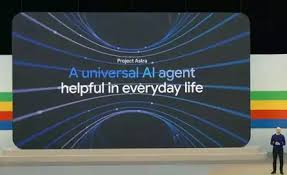The rise of AI agents: What they can do, who is building them, and why it matters

In just a few years, artificial intelligence has evolved from a passive tool to a powerful and proactive force. At the center of this evolution is the rise of AI agents—autonomous, goal-driven programs that can perform complex tasks with minimal human input. These digital agents are reshaping industries, empowering individuals, and raising critical questions about the future of work and intelligence itself.
But what exactly are AI agents, who’s building them, and why should we care? Let’s explore.
What Are AI Agents?
Unlike traditional AI systems that simply respond to commands or queries (like a voice assistant or chatbot), AI agents are designed to act independently to accomplish goals. They can perceive their environment, plan multi-step tasks, make decisions, and take action—all with minimal guidance.
For instance, instead of asking a chatbot, “Find me a flight to Delhi,” an AI agent can autonomously search for flights, compare prices, book the best option, and even schedule it on your calendar. It doesn’t just answer—you delegate a job, and it gets done.
This evolution turns AI into something closer to a digital coworker or assistant, capable of understanding context, navigating tools like browsers or spreadsheets, and adjusting its approach based on feedback or changes in environment.
What Can AI Agents Do?
AI agents are already capable of performing a surprisingly wide range of tasks, including:
🔍 Research & Web Browsing
AI agents can scour the web, extract relevant information, summarize documents, and even cite credible sources—ideal for students, journalists, and analysts.
📧 Email & Calendar Management
Need help clearing your inbox? AI agents can read and respond to emails, schedule meetings, and even prioritize tasks based on urgency and context.
💻 Code Writing & Debugging
Developers are using agents to write scripts, fix bugs, and run tests autonomously. Tools like AutoGPT can complete full-stack software tasks when configured correctly.
🎨 Content Creation
From writing blogs to designing social media posts, AI agents are capable of generating, editing, and refining content with minimal supervision.
🛠 Workflow Automation
Agents are being trained to operate CRMs, manage supply chains, or monitor data dashboards—dramatically reducing the need for manual labor in enterprise operations.
These agents can work alone or in multi-agent systems, collaborating like teams to break down and solve larger tasks, all while learning and adapting over time.
Who Is Building These AI Agents?
The AI agent space is bustling with innovation. Both tech giants and nimble startups are investing heavily to create agents that are more capable, trustworthy, and user-friendly.
🏢 Big Tech
- OpenAI: Developers behind ChatGPT have introduced memory, browsing, and coding tools to push toward full agent behavior. Projects like AutoGPT allow for task autonomy.
- Google DeepMind: Its Gemini model combines reasoning, planning, and action-taking, with a focus on safety and reliability.
- Microsoft: Through Copilot, Microsoft is embedding AI agents directly into Word, Excel, and Windows, turning productivity apps into intelligent assistants.
- Anthropic: Their Claude models are evolving into multi-tool agents that can understand long context and perform complex reasoning.
🚀 Startups and Open Source
- Adept AI: Focused on building agents that can interact with software tools just like humans.
- Inflection AI: Built “Pi,” a personal AI companion focused on emotional intelligence.
- LangChain, AutoGPT, and AgentGPT: These open-source frameworks allow developers to create and customize their own AI agents with specific tools and goals.
- Rabbit & Humane: Pioneering AI-powered wearables and personal memory assistants, turning the agent concept into a tangible, everyday utility.
The innovation happening in open-source communities is just as influential, democratizing access to agent technology and accelerating experimentation worldwide.
Why It Matters
The growing adoption of AI agents has far-reaching implications for society, the economy, and individual users.
1. Productivity on Steroids
AI agents promise to drastically reduce the time we spend on repetitive or mundane tasks. What once took hours—booking travel, filtering resumes, analyzing reports—can now be done in minutes.
2. Economic Disruption
Just as industrial machines displaced manual labor, AI agents will automate white-collar tasks. Roles in customer support, finance, HR, and marketing will shift toward supervision, strategy, and oversight, while routine execution becomes the domain of software.
3. Empowerment for All
Non-technical users can now perform tasks that once required specialists—like writing code, analyzing data, or optimizing campaigns. AI agents act like personal productivity power-ups, unlocking new levels of efficiency and creativity.
4. Platform Shift
Just as smartphones changed the way we interact with technology, AI agents could represent the next big platform shift. In the future, instead of switching between apps, users might just tell an agent what they need, and it will use tools and platforms in the background to get it done.
5. Ethical and Social Concerns
The flip side of this powerful technology is the risk it poses:
- Privacy: How much should agents know about us to help effectively?
- Misinformation: Can agents be manipulated to spread false narratives?
- Bias & Accountability: Who’s responsible when an agent makes a bad decision?
- Autonomy vs. Control: How do we keep agents from going “rogue” in multi-agent environments?
The challenge ahead is to build safe, aligned, and trustworthy agents that act in the user’s best interest and remain under meaningful human oversight.
Final Thoughts
The rise of AI agents represents one of the most exciting and transformative developments in technology today. From automating tedious tasks to enabling entirely new capabilities, AI agents are redefining what machines can do—and what humans can achieve.
As these agents become more intelligent, more proactive, and more embedded in our digital lives, the question isn’t just what can they do? It’s how will we adapt—and what will we choose to do with the time and freedom they unlock?






